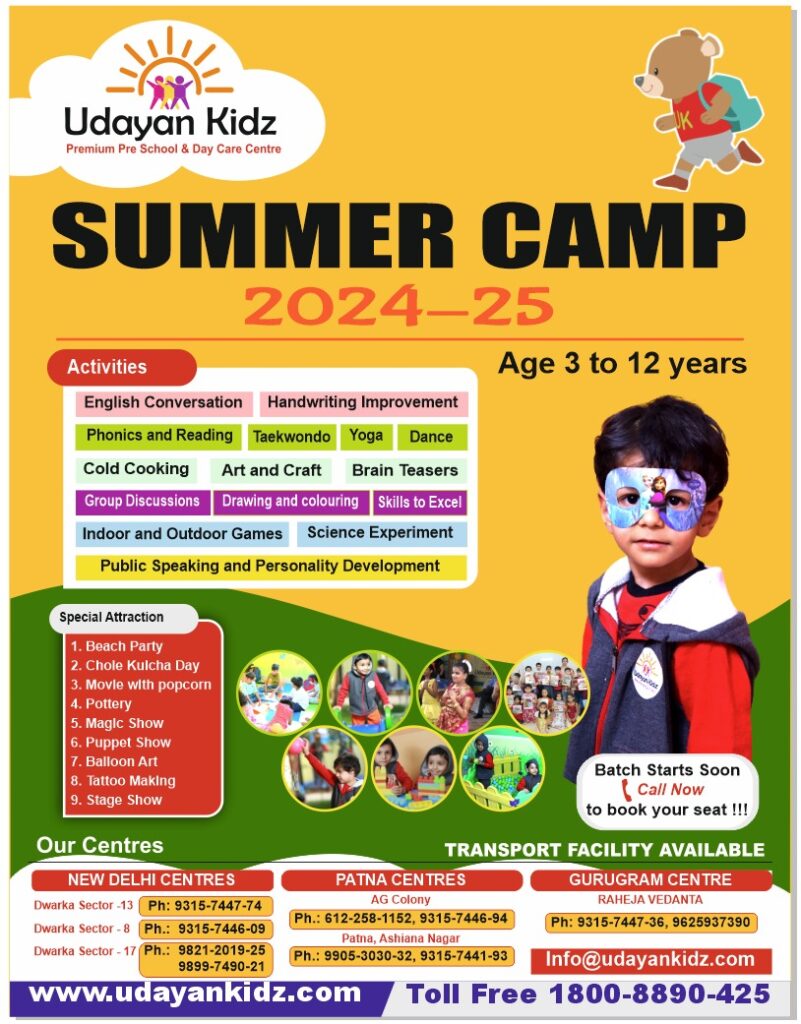
As the school bells ring one final time before summer break, children eagerly look forward to the adventures awaiting them during their well-deserved time off. Among the many options available to fill their summer days, one activity stands out for its mix of fun, learning, and personal growth: the summer camp. More than just a fun retreat, summer camps have become a key part of education, offering children a special place to thrive outside the traditional classroom.
Udayan Kidz Premium Preschool and Day Care Center is the Best School to conduct Summer Camp
What is a summer camp?
These are programs designed to give children enriching experiences during school holidays. These camps have a variety of activities, including sports, arts, academics, and adventure, to match the different interests and needs of young learners.
Why is Summercamp Important in Education?
These are very important in education for several good reasons:
Holistic Development
First, summer camps help overall development by nurturing social, emotional, and physical skills. Campers learn important life skills through fun activities and team challenges such as teamwork, leadership, resilience, and problem-solving.
Experiential Learning
Next, unlike regular classroom learning, summer camps focus on hands-on learning. Children actively engage in activities, experiments, and outdoor exploration. This way of learning helps them remember better and sparks curiosity and creativity.
Personal Growth
Summer camp also provides a safe and supportive environment for children to leave their comfort zones, face challenges, and find their strengths and passions. Campers build confidence, self-esteem, and a sense of identity by overcoming a fear of heights or learning a new art skill.
Social Connection
In today’s digital world, summer camps offer a great chance for children to disconnect from screens and connect with peers face-to-face. Campers develop key social skills by making new friends and working in groups that help them build healthy relationships and engage with their community.
How Should Summercamps be Conducted?
The success of a summer camp depends on careful planning, skilled leaders, and a mix of planned activities and free time. Here are some key points for organizing a fun and impactful summer camp:
Diverse Program Offerings
First, offer various activities including sports, arts, academics, and outdoor adventures. Ensure the program suits different learning styles and abilities so every camper finds something they enjoy and grow from.
Qualified Staff and Supervision
Next, hire experienced and passionate counselors, instructors, and specialists committed to creating a safe, inclusive, and fun environment for all campers. Provide them with proper training and supervision to ensure the safety and well-being of every camper.
Integration of Learning and Fun
Then, balance educational activities with fun ones by mixing learning goals into engaging activities. Create a culture of curiosity, exploration, and discovery where campers feel encouraged to pursue their interests and unleash their creativity.
Celebration of Diversity and Inclusion
Finally, create a welcoming environment that celebrates the diverse backgrounds, abilities, and identities of campers. Encourage cultural exchange, teamwork, and mutual respect to foster a sense of belonging and unity within the camp community.
Benefits of Attending Summer Camps
The benefits of attending summer camp last far beyond the summer months, leaving a lasting impact on children’s lives:
Academic Enrichment
Summer camps offer great chances for academic improvement in subjects like language arts, math, science, and technology. Through interactive workshops and hands-on projects, campers strengthen their academic skills and develop a love for learning.
Physical Fitness and Well-being
With a focus on outdoor activities and sports, summer camps promote physical fitness, health, and well-being. Whether learning a new yoga pose or exploring nature trails, campers develop healthy habits of exercise, resilience, and self-care.
Creative Expression and Self-Discovery
Through arts and crafts, music and dance, drama and storytelling, summer camps ignite campers’ imagination and creativity. Children discover new talents, passions, and ways to express themselves that enrich their lives.
Social Skills and Emotional Intelligence
Summer camp provide a supportive environment for children to develop essential social skills like communication, teamwork, empathy, and conflict resolution. By interacting with peers from different backgrounds, campers build meaningful friendships and emotional intelligence.
Confidence and Independence
Away from home comforts, children have the chance to challenge themselves and try new things at Summer camp. Whether overcoming a fear or leading a team project, campers build confidence, resilience, and independence that help them succeed in life.




